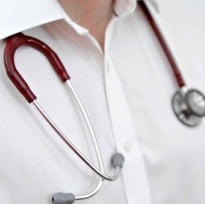Experts say findings help explain why opportunities to diagnose cancer early are being missed
People are risking their lives because they nearly always do not recognise warning signs of cancer as potential symptoms of the disease, new research shows.
Although more than half of the 1,724 people in the study suffered bleeding, an unexplained cough or other common signs of cancer, just 2% of them realised they could have Britain's biggest killer.
Experts say the findings help explain why opportunities to diagnose cancer early are being missed and that efforts to persuade people to visit their GP for a check-up need to be stepped up.
Of the 1,724 patients aged 50 or over at three GP surgeries in east London who took part, 915 (53%) had experienced at least one of 17 different cancer "alarm" symptom in the previous three months, such as bleeding, persistent change in their bowel or bladder habits or a cough.
However, only 20 (1%) of them identified their symptom as indicating they may have developed cancer. Instead they assumed those signs were related to their age or proof they may have a less serious condition such as an infection, arthritis, piles or cysts.
The authors said it was "worrying" that patients rarely recognised some of the more obvious warning signs of cancer, such as unexplained lumps or changes to the appearance of a mole, especially as surveys of public awareness of potential telltale signs of cancer showed that they were usually well recognised.
This lack of knowledge among patients could mean they do not go and see a doctor, and thus do not have their cancer diagnosed until later than it might otherwise have been, they warned.
"Most people with potential warning signs don't have cancer, but some will and others may have other diseases that would benefit from early attention," said Dr Katriina Wheeler, a senior research fellow at University College London and the lead author of the Cancer Research UK-funded study.
Even when people thought their symptoms might be serious, they usually did not think cancer may be the explanation. "This might be because people were frightened and reluctant to mention cancer, thought cancer wouldn't happen to them, or believed other causes were more likely", added Wheeler.
However, more encouragingly, 60% of the 915 people in the study, who between them reported a total of 1,584 alarm symptoms, visited a doctor as a result.
"It is really worrying that people might not realise how serious some of their signs and symptoms are. People need to be seen by a doctor if cancer is to be caught early", said Dr Rosie Loftus, joint chief medical officer at Macmillan Cancer Support.
"We need to support GPs to enable referral as soon as possible when they come to see them. This could give them a better chance of getting the right treatment and surviving cancer," she added.
Sara Hiom, CRUK's director of early diagnosis, urged people with warning signs to see their doctor urgently. "It's not a waste of time for the GP or the patient; it really could save your life. Most cancers are picked up through people going to their GP about symptoms, and this study indicates that opportunities for early diagnosis are being missed". Hiom added.
Experts say efforts to persuade people to visit their GP for a check-up need to be stepped up. Photograph: Andrew Matthews/PA







